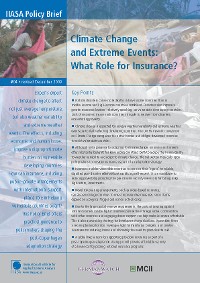Climate Change and Extreme Events: What Role for Insurance?
Key points
- Natural disasters cause more deaths in low-income countries than in middle-income and high-income countries combined. Disasters also impose a greater economic burden, relatively speaking, on vulnerable developing countries. Lack of resources means such countries struggle to recover from disasters, exacerbating poverty.
- Climate change is expected to increase weather variability and extreme weather events particularly affecting developing countries. The UN Framework Convention on Climate Change recognizes the unfair burden and obliges developed countries to assist vulnerable countries.
- Although not a panacea for adapting to climate change, insurance instruments offer substantial benefits for low-income countries, both to reduce their vulnerability to weather variability and adapt to climate change. The Bali Action Plan calls upon policymakers to consider insurance as part of an adaptation strategy.
- Insurance enables vulnerable countries to exercise their “rights” to reliable, dignified post-disaster relief without sacrificing self-respect; it can contribute to reducing poverty by providing the pre-disaster security necessary for taking risky, high-return, investments.
- Novel risk-sharing arrangements, such as index-based insurance, can also encourage countries to invest in preventive measures, since claims depend on a physical trigger and not on actual losses.
- Due to the large capital-reserve requirements, the costs of insuring against natural disasters can be high if countries pursue the strategy alone. Coordination with other countries and engaging donor support can help make insurance affordable. This is also a promising strategy for development organizations: it provides them a secure planning horizon, leverages tight humanitarian budgets, and creates incentives for reducing losses and ultimately the need for post-disaster aid.
- A global mechanism for supporting pro-poor insurance as part of a post-Copenhagen adaptation strategy could provide affordable security at a lower cost by pooling national insurance programs.
Read full policy brief (PDF).



